The Summer of Robert A. Heinlein: Destination Moon
On the heels of last summer's exploration of some of Arthur C. Clarke's greatest hits, this summer we're moving on to another of the Big Three: Robert A. Heinlein. Heinlein is probably the most challenging of the three, with his brand of science-fiction unafraid to get political, satirical, and offensive. Though he studies and respects the underlying science, he is not as concerned with the details the way Clarke is, nor does he often deal with the high-flung future fantasy of Asimov. His brand of science-fiction is grittier, focused more on hard-boiled characters, wicked dialogue, and provocation. He deserves his reputation as one of science-fiction's most talented literary figures, with a bibliography that includes some of the most influential novels of the Twentieth Century (sci-fi or otherwise), and though I couldn't possibly cover all of his great writings in a single summer, I do hope to cover some of the highlights of his career, from his juvenile pulp fiction early works to the somber political meditations of his later years. I intend to reveal over the course of the season exactly what it is that makes Heinlein required reading for anybody interested in science-fiction's golden age.
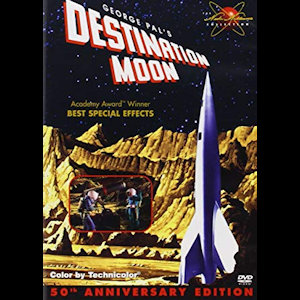 | | Destination Moon |
When fledgling movie producer George Pal set out to create one of the first serious science-fiction films, he turned to Robert Heinlein for technical advice. Since the film Pal envisioned, called Destination Moon, involved a manned mission to the lunar surface, Heinlein's unique fascination with the subject made him an invaluable resource. Before long, Heinlein had taken the reins of the preliminary screenplay and reworked it as a pseudo-adaptation of his own book Rocket Ship Galileo.
Destination Moon would prove to be a groundbreaking work of sci-fi cinema that earned a killing at the box office, and it not only launched George Pal's legendary career and the golden age of science-fiction cinema, it showed audiences that the idea of a man setting foot on the moon isn't as crazy as people used to think. It's difficult to watch the movie today with the mindset of audiences in 1950--and as such, it hasn't aged particularly well--but it's not an exaggeration to say that it is one of the most important science-fiction films ever made, and Heinlein's contribution to it was critical.
Heinlein had previously learned quite a bit about the technological hurdles and logistical difficulties involved in a manned mission to the moon--most of which made its way into Rocket Ship Galileo--and he honed that knowledge even further with his screenplay for Destination Moon. He took Pal's priorities and ran with them, setting out to make as realistic a portrayal of the subject as possible, and he was able to achieve all of the drama from the realism instead of contriving it through a forced romance or wild suppositions about aliens or space Nazis. Heinlein's script did include a little bit about the crew of the Luna finding evidence of previous inhabitants of the moon that could have either been aliens or Russians--with things left vague enough to be explained away however audiences liked--but this minor subplot was taken out of the final film, either by Pal or, more likely, the director, Irving Pichel.
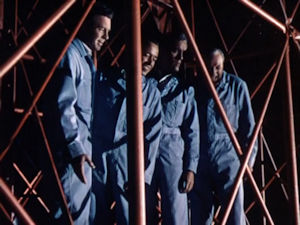 | | Despite the lack of star power, these four guys carry the movie well |
As an adaptation, it's pretty far from the book. The general idea of four men building a rocket out in the desert and launching it to the moon before they can be stopped by saboteurs or the government is the same, but virtually everything else is different. The character of Cargraves is completely changed, and of course, the three boys are replaced by a charismatic entrepreneur, a retired general, and a mechanic. All four are played by relatively unknown character actors, though they all deliver memorable performances and do a fantastic job feeling like four very different people. The third act drops the saboteur subplot (which paid off in the book with the aforementioned space Nazis) and relies on a fuel problem to create the climactic conflict whereby the four men must come up with a clever solution in order to get home. This rings true in hindsight--as there are plenty of real life examples in spaceflight of human error leading to disastrous consequences that require ingenious solutions on the fly, perhaps none so well known as the story of Apollo 13--and shows Heinlein's ability to craft something genuine.
As a result of this realist approach to the subject, Destination Moon stands out as one of the most plausible sci-fi films of the age. Modern audiences who treat a moon landing as a historical fact (let's not get distracted by the crazies who dispute it ever happened) might not immediately grasp what's so special about Destination Moon, though, and might get hung up on the handful of things it gets wrong. For example, as he did with Rocket Ship Galileo, Heinlein conceives of a rocketship powered by atomic energy rather than the solid fuel that wound up being the standard for spaceflight. This is certainly an inaccurate prediction, but it's worth noting that nuclear-powered rocketry was considered and even tested by both NASA and the Russians before being abandoned as impractically dangerous.
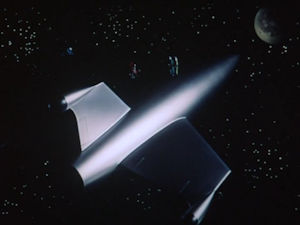 | | This was absolutely mind-blowing in its time |
Still, the things Heinlein gets right are things modern audiences are liable to take for granted. The practical realities of a lunar journey--from the complications of gravity to the unintuitive physics of spaceflight--are common knowledge for most people today, hammered into humanity's collective consciousness throughout the space age and beyond, but for general audiences in 1950, these things were speculative and unfamiliar. Destination Moon may look to modern eyes like a primitive and flawed attempt to imagine what Apollo 11 would look like twenty years later, but for the intended audience of the time, it looked like a genuine, thoughtful peek into the future.
For everything it gets wrong, it gets a lot more right. Sure, Heinlein's free market idealism prevented him from seeing how the space race would actually pan out in terms of government sponsorship, and sure, he threw in some necessary conceits that made the story more easily filmable, like magical magnetic boots. However, the fact that he even foresaw the space race is astonishing in its own right. Heinlein proves his might as a futurist here, and his imagined trip to the moon is much, much closer to reality than Jules Verne's more lauded works from half a century earlier.
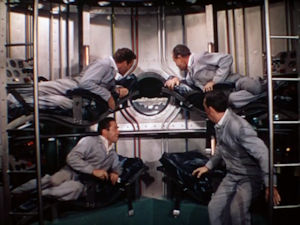 | | It sticks the landing |
It's also undeniably Heinleinian. The dialogue has that snappy, hard-boiled cleverness that defines all of Heinlein's work, and his cynicism about human nature is as vivid as his grand hope for humanity's capacity to overcome all obstacles. Film historians debate amongst themselves about how much of an influence Heinlein actually had on Destination Moon, but anyone who's read more than a few of his words knows beyond any doubt that this is Heinlein's movie as much as it is George Pal's or Irving Pichel's.
It also had an impact on Heinlein's work moving forward. It would still take him a few more years to leave the juvenile works behind and embrace harder-edged sci-fi, but the impulse seems to start right around the same time as this film. Destination Moon gave Heinlein a new level of respectability, which in turn gave him more confidence to explore the limits of real, scientifically-based speculation. What's most remarkable is that Heinlein wouldn't really go back to Hollywood after this success--and the handful of other movies that claim to be adapted from his work are disappointing at best--which is a damn shame if you ask me. The world of sci-fi cinema could have used a few more Destination Moons.
-e. magill 6/13/2019
THE SUMMER OF
ROBERT A. HEINLEIN: | |
|
| MORE LIKE THIS: |
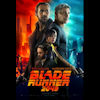
|
Blade Runner 2049 - Movie Review
After thirty-five years, is this sequel too-little-too-late, or is Blade Runner 2049 destined to become an important cultural milestone that lives up to its predecessor? [10/12/2017]
|
|
|
|
|